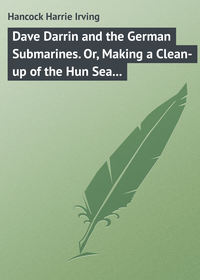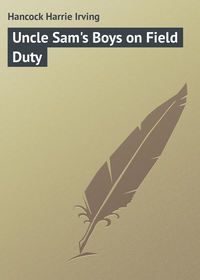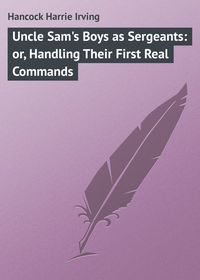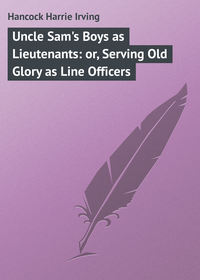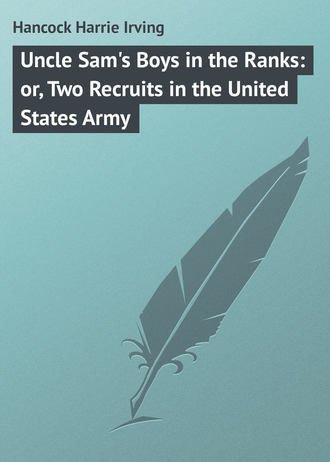 полная версия
полная версияUncle Sam's Boys in the Ranks: or, Two Recruits in the United States Army
"Attention!"
Instantly every man in the room rose and wheeled about, standing at the position of the soldier. An officer, followed by the first sergeant of A Company, was entering the room.
As the officer came to a halt the first sergeant called:
"Overton and Terry, step forward."
Hal and Noll approached the officer and the sergeant, then again stood at attention. The officer was the post adjutant, and now he spoke:
"Overton and Terry, your company commander is satisfied that you are now sufficiently instructed to go to your regiment. We have a draft for two men for the first battalion of the Thirty-fourth Infantry, stationed at Fort Clowdry, in the Colorado mountains. If you have any objections to that regiment, or station, I will listen to them."
"Colorado will very exactly suit me, sir, thank you," Hal replied, his pleasure showing in his face.
"And me also, sir," added Noll.
"Very good, then. You will both report to Sergeant Brimmer, on his return, that you are released from further duty here. You will report at my office at half-past two this afternoon for your instructions. That is all. Sergeant, follow me to the next squad room."
The instant that the door closed Hal and Noll began to execute a swift little dance of joy, while the other rookies looked on in grinning congratulation.
"What sort of regiment is the Thirty-fourth, Sergeant?" asked Hal, after he and Noll had reported to Sergeant Brimmer.
"Just like any other infantry regiment," replied Sergeant Brimmer. "They're all alike. The only difference is in the station, and the station of each infantry command is usually changed every two or three years. For that matter, though you join in the Rockies, your regiment, two months later, may be ordered to the Philippines."
That afternoon Hal and Noll reported at the post adjutant's office. Here they were provided with their railway tickets through to their new station, and were handed each a sum of money in place of rations. In addition they were granted four days' furlough before starting, this furlough to be spent at their homes. Then, each carrying his canvas case containing his surplus outfit, the young recruits started down to the dock to take the three-thirty boat to New York City.
What a glorious furlough it was, while it lasted! All their old schoolmates in the home town, and all the smaller youngsters, listened to the tales Hal and Noll told of the Army. Two or three dozen youngsters then and there formed their resolutions to enlist in the Army as soon as they were old enough.
Tip Branders had left town. Where Tip had gone was not known – but Uncle Sam's two young recruits were destined to find out later on.
CHAPTER X
A SWIFT CALL TO DUTY
"SEE that man in the black derby and the brown suit, coming this way, Noll? The one with the iron-gray hair?"
"Of course," replied Noll.
"Salute him, if we get close enough."
"Why?"
"He's an officer."
"Maybe," half-assented Noll, eyeing the man with iron-gray hair.
"There isn't much doubt about it," retorted Hal. "He boarded the train at Kansas City. It's summer, but he's going somewhere up in the hills, for he had an overcoat over one arm when he boarded the train, and that overcoat was an officer's coat. He's in the service, and he isn't any junior officer, either, judging by the color of his hair."
"But – "
"Sh! Be ready with your salute."
The two young recruits, their uniforms looking spick and span, despite their long journey by train, now brought their right hands smartly up to their cap visors as the man with iron-gray hair stepped close.
He gave Hal and Noll a prompt, smart acknowledgment of their salute, then suddenly paused, glanced at them, and asked:
"My men, how did you know me to be an officer?"
"I observed your overcoat, sir, when you boarded the train at Kansas City," Hal answered.
"You judged rightly, men," replied the officer, with a smile. "I am Major Davis, Seventeenth Cavalry. And you, as I see by your caps, belong to the Thirty-fourth Infantry."
"Yes, sir," Hal answered. "We are joining the first battalion at Fort Clowdry."
"Recruits?"
"Yes, sir."
"I wish you a pleasant life in the Army, men."
"Thank you, sir; we feel certain of finding it," Hal replied.
Both young soldiers saluted, again, as the major turned to resume his walk.
The train had stopped at Pueblo, Colorado, in the middle of the afternoon. It would be but half an hour's delay. Noll had been eager to step out away from the railway station and see as much of Pueblo as was possible. Hal had negatived this idea, through fear that they might be left behind.
"And we've not an hour to spare, you know, Noll. This is the last train for us to take if we're to report in season. So we'd better stay close to the conductor."
During the forenoon the train had rolled across the mesa or tableland below Pueblo. Hal and Noll, seated in one of the two day coaches of the train, had studied the mesa with longing eyes. Here they caught occasional glimpses of cowboys on ponies, for this mesa is still a favorite cattle region.
At this height of some five thousand feet above sea level even the late June day was not really hot. It was a glorious country on which the young recruits feasted their eyes.
"Where do we eat next?" asked Noll, of a trainman standing by.
"Any time and place you like, if you've got the chow with you," replied the trainman.
"What is the next eating station at which the train stops?" Noll insisted.
"Salida. We ought to stop there about nine o'clock to-night."
"Good eating place?"
"Great."
"It's a long time to wait," complained Noll, whom the mountain air was making furiously hungry. "Come along, Hal. We'll lay in a few sandwiches as a safety-valve."
"I hope they're not as bad as some we've bought along the way," Hal laughed, as they started toward the railroad restaurant. "Do you remember the sandwich we bought at Chicago that had the stamp on the under side, 'U. S. Army, 1863?'"
"No, and neither do you," grinned Noll.
"Fact," insisted Hal. "I found the stamp on the sandwich, and threw it out of the car. I'm sorry, now; I wish I had saved that sandwich for a curiosity. Father would have been proud of it."
Noll with a bag of sandwiches, Hal with a box of fruit, the two recruits turned toward the train again.
They were soon under way. After leaving Pueblo they forgot all about eating, for some time, for the train now bore them through some of the most picturesque parts of the lower Rocky Mountains. Both rookies spent their time on one of the car platforms, hanging far out at either side to get better views, as well as glimpses down steep cliffs into gullies below.
"Say, it's going to be dark, soon," remarked Noll, looking toward the western sky. "Why on earth didn't we get a train that would do the whole trip between Pueblo and Salida in daylight?"
"Because we didn't know the route well enough," sighed Hal. "However, we may think we've had plenty of Rocky Mountains before our regiment's station is changed."
Half an hour later both went back to their seat in the car. Black night had come on and shut out all further possibility of viewing the wonderful country through which the train was passing.
"We can eat, anyway," sighed Noll.
For the next fifteen minutes they regaled themselves, though they were careful not to eat enough to spoil their appetite for a good hot supper at Salida.
Then, as peering out of the window revealed nothing, Noll settled back in the seat.
"If I go to sleep, be sure to wake me at Salida," he begged. "What time is the train due at Fort Clowdry?"
"Two o'clock in the morning," Hal answered.
"That's a beastly time to have to be awake," growled Noll, and began to slumber.
Not for long, however. On a steep up-grade the train was barely crawling along.
Suddenly it stopped, and with a considerable jolt, too.
Bang, bang, bang! The whistle of bullets was heard alongside the train, wherever windows were open.
"What's that?" demanded Noll, jumping up.
But Hal was in the aisle before him. Both hastened to the rear door.
"Here, laddy-bucks," called a brakeman grimly, "stay inside! It's healthier!"
"What's up?" demanded Hal, without pausing.
"Judging by the sound, the train is held up, laddy-buck. It's a bad business going outside if that's the case."
But at this instant the door was opened before Hal's face. Major Davis bounded into the car.
"Come with me, men," he called sharply. "You're not armed, are you?"
"No, sir."
Even at that exciting moment Hal did not forget his salute.
"Then keep behind me," ordered the major, drawing his revolver. "This is a mail train, and, as a United States officer, I can't allow an attempt to rob it pass without an attempt at a protest."
CHAPTER XI
GUARDING THE MAIL TRAIN
MAJOR DAVIS backed quickly out of the car, holding his weapon behind his back as he dropped to the ground beside the car.
He did not look to see whether the rookies were behind him, but they were.
Ahead, and about them, all was black, save for the light that came through the car windows.
In a twinkling, out of the fringe of darkness, almost beside the recruits, stepped a masked man.
"Back, all three of you. Back into the car!" called the masked man sharply.
Major Davis wheeled like a flash, bringing his revolver to bear. But he could not use it. A sudden move of the recruits prevented.
"Noll!" called Hal sharply, and threw himself to the ground before the masked ruffian.
Like a flash Hal wrapped his arms around the knees of the masked robber. In almost the same instant Hal struggled to his feet, carrying the unknown's legs up with him.
Of course the ruffian toppled over backward. But Noll, who had darted to his chum's aid, hurled himself upon the fellow, striking him hard three times between the eyes.
The masked man's revolver was discharged as he toppled over backward, but the bullet sped harmlessly off into the night.
In another second Hal had the fellow's revolver.
"Fix him, Noll!" called Private Overton, darting forward to the officer's side.
"I have, already," muttered Noll. But he bent for an instant over the unconscious ruffian's body, then darted forward.
"Here's his box of cartridges, Hal," panted Noll.
All this had seemed to occupy but a few seconds.
"Splendidly done!" glowed Major Davis. "Now come forward, and support me."
At the moment of the discharge of the pistol the uncoupled engine started forward, away from the train, with a hissing of steam. This noise must have drowned out the noise of the single shot from the train robbers up forward.
Suddenly Major Davis shot out his left arm, and Hal, bumping against it, halted beside the officer.
"There are two of the men, standing by the mail car," whispered the major. "Raise your revolver. Ready! Fire!"
Both the major's revolver and Hal's spat out jets of flame. Both poured their shots in rapidly at the two men whom they could just make out in the darkness ahead.
Then Hal had a sudden, new sensation, not by any means agreeable.
The two men, neither hit so far, turned and raised their own weapons. It seemed like two bright cascades of flame just ahead, as the ruffians fired, kneeling.
Bullets whistled close to the major and the two recruits on either side.
Then, just as suddenly, one of the ruffians toppled over; it was impossible to tell whether Major Davis or Hal Overton had scored the hit.
Thereupon, the other man, lowering his weapon, leaped for the steps of the mail car and vanished.
Major Davis ran forward, followed by both recruits. Noll was intent on getting a revolver for himself.
But Davis, more accustomed to the ways of fighting men, suddenly crouched low, peering under the body of the car just behind the mail coach.
Almost immediately the major began to fire again, in answer to shots that came from underneath the car.
But Noll waited for nothing. His sole thought was to possess a weapon. He halted over the fallen one, snatched an empty revolver from his side, then saw that the man was wounded in the right breast.
"You must have some cartridges," muttered Noll, rummaging in the fellow's clothes.
He found the box just in time.
"Lie down, you two!" called Major Davis sharply to Hal and Noll. "You'll be fired on from ahead."
Hal threw himself flat, and none too soon, for now a gust of bullets swept down from the head of the train.
As coolly as he could Hal Overton reloaded. Noll, also lying flat on the ground, was similarly engaged.
Hal was ready to fire first. There was need of it, too, for he could dimly make out two men, near the extreme head of the train, who were firing rapidly and firing their weapons in a fashion that drove up spurts of dirt all about the recruits.
For a few seconds the fight seemed as serious to those engaged in it as battle on a larger scale could have been.
Major Davis now made the first direct move. He crawled swiftly under the car, putting himself on the same side with the man he was after.
There was more shooting on the other side of the train; then, suddenly it stopped.
The two ahead, who were engaging Hal and Noll, dodged off to the side of the track into the darkness. Now, all firing stopped, for all weapons were empty.
"I hope that other scoundrel didn't get the major!" throbbed Hal anxiously.
Yet he couldn't go to see. He had his own work on this side of the train.
"Where are our pair?" whispered Noll, creeping closer.
"I don't know," Hal answered, also in a whisper. "But crawl off a little way. Bunching together gives 'em a better mark to hit."
Lying flat on the ground, both recruits played the waiting game.
Had the pair ahead stolen off altogether in the darkness?
"I'll wait a few moments," Hal decided. "Then, if I don't hear from the scoundrels, I'll cross over to see what has happened to Major Davis."
Crack! crack! crack! The vanished pair of train robbers were opening fire again, from behind a boulder that sheltered them admirably. Hal and Noll had no protection other than they could get from lying close to the ground. But they answered the fire briskly.
Crack! crack! crack! As fast as revolvers were emptied the marksmen reloaded and again began firing. In daylight the execution would have been swifter, but all hits made in black darkness are made by the grace of luck.
In the first place the only target anyone in the combat had was the flash of an opponent's pistol.
The train robbers behind the ledge changed their positions after nearly every shot. And Hal and Noll, after the warm, uncomfortable experience of having bullets fan their faces persistently, found it advisable to crouch low and dart here and there, firing from new positions.
All this time the scores of people on the train were sitting in terrified silence. Passengers or train crews rarely interfere in a case of this kind.
Not even the train's lights aided either side, for the two young recruits had taken pains to close in on the ledge sufficiently to escape illumination by the train's lights.
Crack! crack! crack! This was a new note, coming from past the forward end of the ledge.
Almost in the same instant a howl sounded from behind the barrier of rock.
Then another voice was heard, shouting.
"Hold on! We surrender! Stop the shooting!"
Instantly this hail was answered by another. It sounded good to the young recruits as Major Davis roared from behind the forward end of the ledge:
"Then throw up your hands, keep them up, and walk into the train light where we can see you."
"You won't shoot?" demanded the voice of the surrendering one.
"Not unless you attempt tricks," replied the voice of Major Davis.
"All right. Here I come."
A lone figure rose over the edge of the ledge, and a tall, masked man, holding his hands very high, strode toward the train, passing between Hal and Noll, who instantly turned and covered him with their weapons.
"Where's the other man?" demanded Major Davis, still invisible in the blackness beyond.
"You'll find him behind the ledge," returned the surrendered one. "He's hurt too bad to move."
"Overton," called the major, "keep your weapon trained right on that prisoner. Terry, join me behind the ledge."
"Yes, sir," answered both recruits.
Noll was quickly with the major on the further side of the ledge. Here they speedily found a masked man, short and rather thick-set, who had the appearance of being unconscious. He was breathing with great effort, a deep crimson spot appearing on his right breast.
"May I ask, sir, about the man you went under the train to get?" queried Noll.
"He's dead, my man," replied Major Davis very quietly.
"Shall I try to lift this man, sir?"
"No; take his revolver, and search him for other weapons, as far as you can do so without disturbing the fellow and putting him in more pain. We'll let that hiding train crew move the casualties to the baggage car."
So Noll completed his search, while the conductor, baggage-master and some of the brakemen, noting that the firing had stopped, ventured forth.
"You trainmen take care of the dead and wounded," directed Major Davis crisply. "Terry, rejoin your comrade. I shall have to trouble you two men to stand guard over the prisoners in the baggage car until we reach Salida."
Both recruits saluted. Noll returned to the track in time to find that the first man whom he and Hal had bowled over was just coming back to his senses.
CHAPTER XII
THE ROOKIES REACH FORT CLOWDRY
ONCE more the train was under way. The engineer had taken his uncoupled engine some distance up the track, but had returned when sent for, and now the train, twenty additional minutes late, was crawling up the steep grade.
The wounded men lay on the floor of the car, receiving the attentions of a physician who had been found among the passengers.
The unwounded ones stood in a corner at the forward end of the car, Private Hal Overton, revolver in hand, watching the men closely.
Noll, a revolver in either hand, stood a little past the middle of the car, looking wholly businesslike.
Major Davis, having gone back to make sure that his own belongings were safe, now returned to the baggage car.
"Fellow," he asked of the tall prisoner, "what on earth made you stop this train?"
"Hard up," replied the man sullenly. "And a friend told us that the last time he held up a mail train, he and his pal found twelve thousand dollars in the registered mail pouches."
"You'll find at least twelve years in the mail pouches this trip," retorted Major Davis grimly.
Half an hour later a stop was made at a little tank station, to enable Major Davis to wire ahead to Salida for officers to be in readiness when they arrived.
Then the train crawled on again through the inky darkness. Noll relieved Hal, presently, though there seemed little need of alertness. The two prisoners capable of fighting looked pretty well cowed. Down at the rear end of the car, covered with a rubber blanket, lay the rigid remains of the man killed by the major.
Something more than an hour late the train pulled in at Salida. There was a crowd on hand, including four sheriff's officers. These latter came to the baggage car just before the train stopped.
"Will you take full responsibility for the prisoners now?" asked Major Davis of one officer who led the rest and who displayed his badge.
"Yes, sir," replied the deputy sheriff.
"Then I'll go and have something to eat," smiled the major dryly. "My men, do you eat here, too?"
"Yes, sir," Hal answered, saluting.
It was not an invitation to join their officer. Both recruits fully understood that. The gulf of discipline prevents officers and men eating together.
On the platform before the station-building Major Davis halted long enough to say:
"My men, I appreciate your help to-night. It would have been too much for me alone. You men stood by me like soldiers. As a United States Army officer I would have felt disgraced had I allowed a United States mail car to be rifled without striking a blow to stop it."
"It was a daring thing to do, sir," Hal ventured, with another salute.
"It was my plainest sort of duty, as an officer," replied Major Davis, returning the salute.
"May I ask, sir," ventured Hal, "whether it would have been our duty, had we been armed, and you not on the train?"
"Not unless led by an officer," replied the major. "But where did you young men learn to obey so promptly, and without questioning or hesitation?"
"At the recruit rendezvous, sir."
"Which one?"
"At Bedloe's Island, sir."
"Who was your instructor?"
"One of them, sir, was a namesake of yours – Corporal Davis."
"He will be glad to hear of this," nodded the major, smiling. "Corporal Davis is my son."
"Your son, sir – an enlisted man?" stammered Hal.
"Yes. My son enlisted in order to try to win a commission. Thank you, men, and good-night. I will tell the sheriff's men that you will be found at Fort Clowdry if you are wanted as witnesses."
Again acknowledging their salutes, Major Davis stepped inside.
Hal and Noll waited a moment before entering the station. When they did so, and passed on to the lunch room, they saw Major Davis at a table in one corner, so the rookies passed on to stools before the lunch counter.
"How long have we to eat?" asked Hal, of one of the trainmen.
"You've about twenty-two minutes left."
"I feel as if I could make excellent use of all the time," laughed Hal.
He and Noll plunged into hot chicken, potatoes and gravy, and plenty of side dishes. The late excitement had not destroyed the appetite of either recruit.
When they had finished Hal asked the waiter:
"How much do we owe you?"
"Nothing," replied the waiter. "I was told to say that the account is settled, with Major Davis's compliments."
Both recruits turned, saluting in the major's direction, as token of their thanks. He nodded, smiling.
Out on the platform, just before the train started, the recruits saw Major Davis again. That officer was turned halfway from them, without seeing them, so they passed along to the day coach in which they had been riding.
Now a dozen men crowded about them, eager to talk with the young heroes of the night.
"Pretty gritty work that you boys did," grinned one of the men. "Do you often have things like that to do in the Army?"
"We never did, before to-night," Hal answered quietly.
"Must take a lot of nerve."
"We didn't think of it at the time," smiled Hal. "It seemed all in the way of business."
"You ought to have seen the folks you left behind here," put in another man.
"Oh, shut up," called others.
"No, I won't," retorted the last speaker. "What do you suppose we folks that you left behind in this car were doing?"
"Nothing very noisy, was it?" queried Hal.
"Not particularly," admitted the man, with a laugh. "We were lying along the aisle, or else we crawled under seats. At one time there were altogether too many bullets hitting the side of the car, or coming through the windows. None of us in here got hit, but that was because of the good care we took of ourselves."
"Oh, we might have done something," protested another man, "only we didn't have anything to shoot with."
"These two young soldiers didn't have anything to shoot with, either, at the outset of the trouble. They hustled outside and got their guns from the enemy."
"Got any of those guns now?" asked another passenger, crowding forward. "Want to sell any of 'em?"
"We haven't even a cartridge," Hal replied.
"What did you do with them?"
"Turned them over to the sheriff's officers, of course."
It was nearly an hour before the curious passengers would consent to leave the young soldiers to themselves. Noll finally managed to convey an excellent hint by leaning back in his seat and closing his eyes as if in sleep.
Hal dozed somewhat, but by one o'clock in the morning both recruits were wide awake.
"What time are we due at Clowdry?" Hal asked the passing brakeman.


